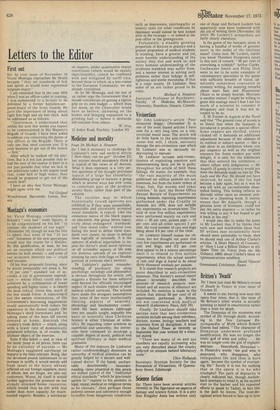Medicine and morality
From Dr Michael A. Simpson
,sir: I feel it necessary to challenge Dr Linklater's very sad medical article (' How crazy can we get?' October 27). . lest anyone should mistakenly think itl is typical of the views of all doctors. What it does represent is a very perfect specimen of the thought processes' typical of a large but thankfully• diminishing group of doctors; a group which in several ways has now comet to constitute part of the problem' society faces, rather than part of the solution.
The cavalier way in which' hysterically voiceti opinions are exhibited as if they were unassailable, immutable and universally accepted moral standards, is typical. Like the eminences noires of the black papers on education, this 'group bleats repetitively about endangered ' standards' and 'clear moral codes' without ever feeling the need to define these standards very closely, let alone to defend them logically or rationally. It is the epitome of medical 'imperialism to impose the doctor's small moral opinions on all accessible aspects of life with the dubious aplomb of an explorer planting his tatty little flags on likeable portions of someone else's territory. Dr Linklater's patient misunderstanding of psychiatry (let alone, psychology, sociology and philosophy) is obvious throughout the article, and suggests a distaste for these subjects: even beyond the officially encouraged neglect of such studies typical of most medical school curricula. The schools have made the arrogant assumption that some of the more intellectually limiting aspects of anatomy, physiology and biochemistry consul.tuted the basic sciences (although they are, usually taught, arguably less basic or scientific than Christian Science is either Christian or scien. tific). By regarding other sciences as superficial and unworthy, the universites have continued to inculcate a culpable degree of moral, political and spiritual illiteracy in their medical graduates.
Many of the matters Dr Linklater rather condescendingly dismisses as unworthy of medical attention can be greatly helped by a sincere and welltrained doctor. If the harsh, unchari
table determinedly misunderstanding views presented in this article are indeed typical of the "traditional ethical standards" which he graciously agrees to "explain to his patients in. legal, moral, medical or religious terms as be chooses," then perhaps those patients unwise and subversive enough to/suffer from dangerous conditions
such as depression, psychopathy or anxiety state (or other conditions he dismisses) would indeed be best looked after at the vicarage — or indeed at the post-office or the greengrocers. Fortunately, a steadily growing proportion of doctors in practice and a greater proportion of medical students in training, have a greater and yet, more humble understanding of the society they live and work in; and more humane understanding of the problems mankind may suffer from, and a keener interest in solving such problems rather than indulge in selfrighteous and sterile moralising. If that, is a crazy society. Dr Linklater, then some of us are rather proud to be crazy. Michael A. Simpson Assistant Professor of Psychiatry,
Faculty. of Medicine, McMasser University, Hamilton, Ontario, Canada.


































 Previous page
Previous page